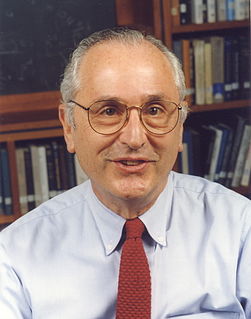A Quote by Paul Davies
Although gravity is by far the weakest force of nature, its insidious and cumulative action serves to determine the ultimate fate not only of individual astronomical objects but of the entire cosmos. The same remorseless attraction that crushes a star operates on a much grander scale on the universe as a whole.
Related Quotes
Ideas are powerful things, requiring not a studious contemplation but an action, even if it is only an inner action. Their acquisition obligates each man in some way to change his life, even if it is only his inner life. They demand to be stood for. They dictate where a man must concentrate his vision. They determine his moral and intellectual priorities. They provide him with allies and make him enemies. In short, ideas impose an interest in their ultimate fate which goes far beyond the realm of the merely reasonable.
I personally feel it is presumptuous to believe that man can determine the whole temporal structure of the universe, its evolution, development and ultimate fate from the first nanosecond of creation to the last 10^10 years, on the basis of three or four facts which are not very accurately known and are disputed among the experts.
"Fate permitting" is a standard Stoic phrase meant to remind ourselves that planning things is up to us, but the ultimate outcomes are not under our control. It helps us to develop an attitude of equanimity toward the universe. We should very much try to change things for the better, that's the whole point of the Stoic discipline of action.
Thus far I have explained the phenomena of the heavens and of our sea by the force of gravity, but I have not yet assigned a cause to gravity. Indeed, this force arises from some cause that penetrates as far as the centers of the sun and planets without any diminution of its power to act, and that acts not in proportion to the quantity of the surfaces of the particles on which it acts (as mechanical causes are wont to do) but in proportion to the quantity of solid matter, and whose action is extended everywhere to immense distances, always decreasing as the squares of the distances.
An Individual, whatever species it might be, is nothing in the Universe. A hundred, a thousand individuals are still nothing. The species are the only creatures of Nature, perpetual creatures, as old and as permanent as it. In order to judge it better, we no longer consider the species as a collection or as a series of similar individuals, but as a whole independent of number, independent of time, a whole always living, always the same, a whole which has been counted as one in the works of creation, and which, as a consequence, makes only a unity in Nature.
The story of the universe finally comes to an end. For the first time in its life, the universe will be permanent and unchanging. Entropy finally stops increasing because the cosmos cannot get any more disordered. Nothing happens, and it keeps not happening, forever. It's what's known as the heat-death of the universe. An era when the cosmos will remain vast and cold and desolate for the rest of time the arrow of time has simply ceased to exist. It's an inescapable fact of the universe written into the fundamental laws of physics, the entire cosmos will die.
Man is only a reed, the weakest in nature, but he is a thinking reed. There is no need for the whole universe to take up arms to crush him: a vapour, a drop of water is enough to kill him. but even if the universe were to crush him, man would still be nobler than his slayer, because he knows that he is dying and the advantage the universe has over him. The universe knows none of this.






































